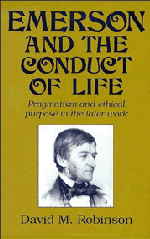Book contents
- Frontmatter
- Contents
- Acknowledgments
- List of Abbreviations
- Introduction
- 1 The Mystic and the Self-made Saint
- 2 Politics and Ecstasy
- 3 The Text of Experience
- 4 “Here or Nowhere”: Essays: Second Series
- 5 The Eclipse of the Hero: Representative Men
- 6 The Old and New Worlds: English Trait
- 7 “Work Is Victory”: The Conduct of Life
- 8 “Plain Living and High Thinking”: Society and Solitude
- 9 Toward a Grammar of the Moral Life
- Notes
- Work Cited
- Index
- Titles in the series
1 - The Mystic and the Self-made Saint
Published online by Cambridge University Press: 18 December 2009
- Frontmatter
- Contents
- Acknowledgments
- List of Abbreviations
- Introduction
- 1 The Mystic and the Self-made Saint
- 2 Politics and Ecstasy
- 3 The Text of Experience
- 4 “Here or Nowhere”: Essays: Second Series
- 5 The Eclipse of the Hero: Representative Men
- 6 The Old and New Worlds: English Trait
- 7 “Work Is Victory”: The Conduct of Life
- 8 “Plain Living and High Thinking”: Society and Solitude
- 9 Toward a Grammar of the Moral Life
- Notes
- Work Cited
- Index
- Titles in the series
Summary
THE INNER DIALOGUE OF SELF-CULTURE
“I complain in my own experience of the feeble influence of thought on life, a ray as pale & ineffectual as that of the sun in our cold and bleak spring. They seem to lie – the actual life, & the intellectual intervals, in parallel lines & never meet”
(JMN, 5:489).In 1837, Ralph Waldo Emerson proposed a new answer to a familiar question of the catechism: “His own Culture,–the unfolding of his nature, is the chief end of man. A divine impulse at the core of his being, impels him to this” (EL, 2:215). This doctrine of self-culture as the end of human existence had been growing in Emerson's thinking since his entry into the ministry in the middle 1820s. It reached fruition in his lectures of the late 1830s, becoming the dominant model of the spiritual life among the liberal thinkers in New England. Its appeal was great. It offered a liberating sense of power and potential by wholly discrediting the Calvinist notion of innate depravity, yet its firm anchoring in the “divine impulse at the core” of human nature made it a spiritually nourishing vision. Its appeal to an intuitive sense of truth lessened the burdens of conventional moral standards, although it imposed its own, perhaps stricter, demands for moral progress.
- Type
- Chapter
- Information
- Emerson and the Conduct of LifePragmatism and Ethical Purpose in the Later Work, pp. 8 - 29Publisher: Cambridge University PressPrint publication year: 1993



